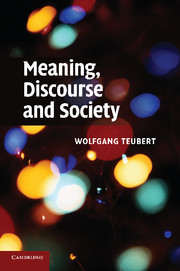Book contents
- Frontmatter
- Contents
- Acknowledgements
- Introduction
- Part I Meaning, the mind and the brain
- Part II Discourse and society
- 8 Language as discourse
- 9 Society presupposes language, and language presupposes society
- 10 A closer look at oral societies
- 11 Differences between oral and literate societies
- 12 Empirical linguistics deals only with recorded language
- 13 Meaning, knowledge and the construction of reality
- 14 The language of the scientific experimental report
- 15 Diachronicity, intertextuality and hermeneutics
- 16 Meaning and the interpretation of a haiku
- Conclusion
- Bibliography
- Index
11 - Differences between oral and literate societies
Published online by Cambridge University Press: 04 August 2010
- Frontmatter
- Contents
- Acknowledgements
- Introduction
- Part I Meaning, the mind and the brain
- Part II Discourse and society
- 8 Language as discourse
- 9 Society presupposes language, and language presupposes society
- 10 A closer look at oral societies
- 11 Differences between oral and literate societies
- 12 Empirical linguistics deals only with recorded language
- 13 Meaning, knowledge and the construction of reality
- 14 The language of the scientific experimental report
- 15 Diachronicity, intertextuality and hermeneutics
- 16 Meaning and the interpretation of a haiku
- Conclusion
- Bibliography
- Index
Summary
As we have seen, we find speech situations in both oral and literate societies, and they differ accordingly. The invention of writing has changed the discourse at large to such an extent that we may well wonder if we really should subsume communication in oral and literate societies under the same umbrella term ‘language’.
A discourse, this entirety of contributions made by the members of a discourse community, is, as far as I see it, more or less equivalent with Saussure's concept of la parole, the manifestation of language. But what is a manifestation of language? How equivalent is the transitory acoustic phenomenon of a speech utterance to the material evidence of a text, carved in stone, written on parchment, or accessible on the internet, downloadable and printable as hardcopy? The spoken language of the primordial speech situation is more than just ‘text’. Text may be a vital part of symbolic interaction, but it is not its sole ingredient. As said above, the linguistic content of a spoken utterance cannot be separated from the setting in which it occurs, from the voice in which it is delivered, from the ostentation, the gestures and the facial expressions that accompany it, not even from the objects that make up the reality shared by the participants of the situation. All these ingredients extend the discourse and are inseparable from what is said.
- Type
- Chapter
- Information
- Meaning, Discourse and Society , pp. 150 - 165Publisher: Cambridge University PressPrint publication year: 2010

